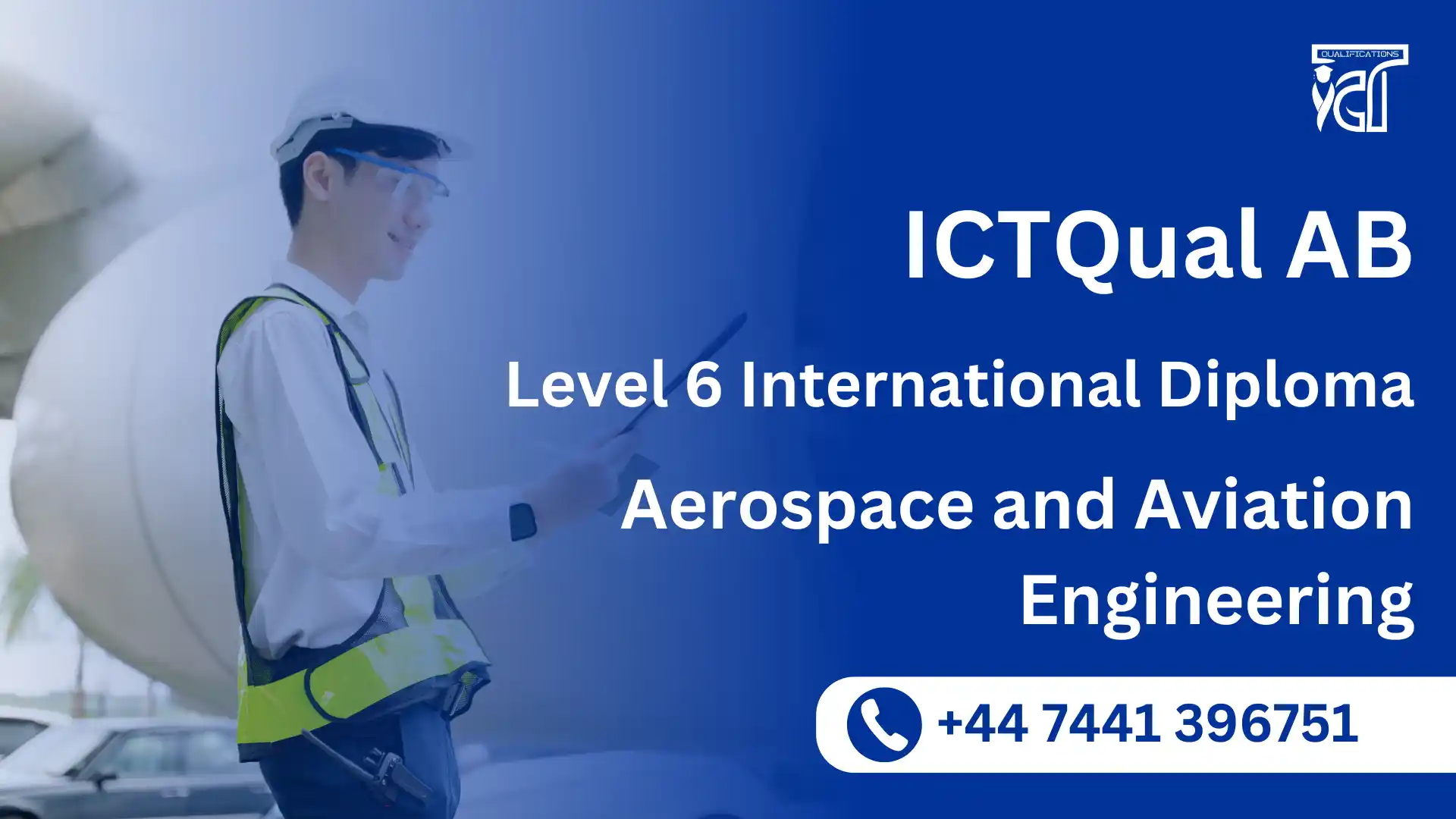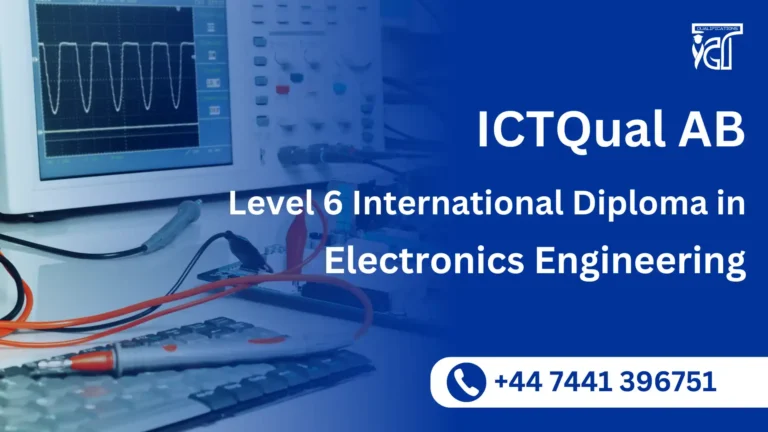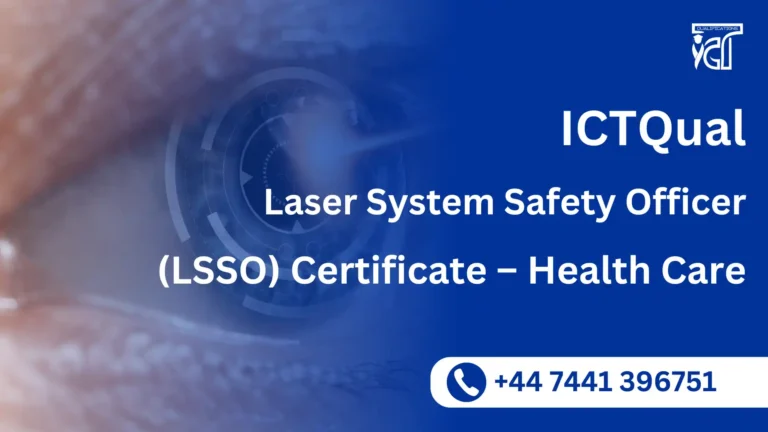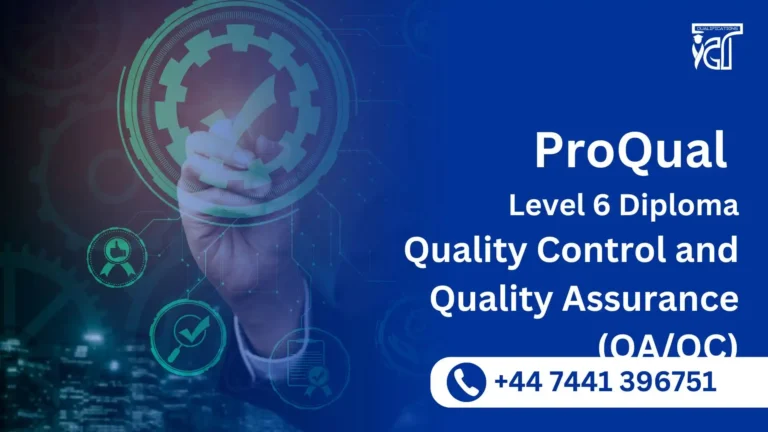The ICTQual AB Level 6 International Diploma in Aerospace and Aviation Engineering is a globally respected qualification designed to prepare learners for advanced roles in one of the most dynamic and high-tech industries worldwide. Delivered over three years and structured at 360 credits, this comprehensive programme equips learners with the essential technical, analytical, and problem-solving skills required to excel in aerospace, aviation, and related engineering sectors.
This diploma is ideal for both fresh learners aspiring to enter the aerospace field and experienced professionals seeking to enhance their expertise or advance into leadership positions. Through a carefully developed curriculum, learners will gain a deep understanding of aircraft design, aerodynamics, propulsion systems, avionics, and cutting-edge aviation technologies. Practical applications, industry case studies, and real-world projects ensure that graduates leave the programme ready to tackle complex engineering challenges with confidence.
Completing this diploma unlocks exciting career opportunities across global aviation companies, aerospace manufacturers, maintenance organisations, and research institutions. Roles such as Aerospace Engineer, Aviation Systems Specialist, Aircraft Maintenance Manager, or Project Engineer become attainable, while the programme also provides a strong foundation for further study, including postgraduate or specialised engineering qualifications.
Key benefits include developing industry-relevant competencies, mastering advanced engineering tools and methodologies, and enhancing problem-solving and leadership skills critical to modern aerospace and aviation environments. Learners will be equipped to contribute to technological innovation, operational efficiency, and safety improvements in a sector that continues to drive global connectivity and economic growth.
Whether you are beginning your journey or seeking to progress within aerospace and aviation engineering, this diploma offers the knowledge, credibility, and practical experience to succeed in a competitive and rapidly evolving global industry.
ICTQual AB Level 6 International Diploma in Aerospace and Aviation Engineering
This qualification, the ICTQual AB Level 6 International Diploma in Aerospace and Aviation Engineering, consists of 36 mandatory units.
Year 1 – Foundation in Aerospace and Aviation Engineering
- Principles of Aerospace and Aviation Engineering
- Engineering Mathematics
- Fundamentals of Mechanical and Electrical Engineering
- Materials Science and Engineering
- Engineering Drawing and Computer-Aided Design (CAD)
- Introduction to Aerodynamics and Flight Mechanics
- Basics of Propulsion Systems
- Aircraft Structures – Fundamentals
- Avionics and Electrical Systems – Basics
- Health, Safety, and Environmental Practices in Aviation
- Communication and Technical Report Writing
- Introduction to Project Management in Engineering
Year 2 – Intermediate Studies in Aerospace and Aviation Engineering
- Aerodynamics and Fluid Dynamics – Applications
- Propulsion Systems and Gas Turbine Engines
- Aircraft Structural Analysis and Design
- Avionics and Navigation Systems
- Flight Mechanics and Performance Analysis
- Aerospace Materials and Manufacturing Processes
- Aircraft Maintenance and Reliability Engineering
- Systems Engineering in Aerospace Projects
- Unmanned Aerial Vehicles (UAV) – Fundamentals
- Sustainable Aviation and Green Technologies
- Applied Research Methods in Aerospace Engineering
- Project Planning and Aviation Operations Management
Year 3 – Advanced Studies in Aerospace and Aviation Engineering
- Advanced Aerodynamics and Computational Fluid Dynamics (CFD)
- Advanced Propulsion and Rocket Systems
- Advanced Structural Analysis and Composite Materials
- Flight Control Systems and Automation
- Space Systems Engineering and Satellite Technology
- Robotics and Autonomous Systems in Aviation
- Smart Aviation Technologies and Industry 4.0
- Aviation Safety, Risk, and Quality Management
- Cyber-Physical Systems and IoT in Aerospace Engineering
- Professional Ethics and Sustainability in Aerospace Engineering
- Innovation, Entrepreneurship, and Aviation Business Development
- Final Year Major Project (Capstone Project)
Learning Outcomes for the ICTQual AB Level 6 International Diploma in Aerospace and Aviation Engineering:
Year 1 – Foundation in Aerospace and Aviation Engineering
Principles of Aerospace and Aviation Engineering
- Understand the scope and importance of aerospace and aviation engineering.
- Identify key components of aircraft and aerospace systems.
- Explain the basic principles of flight and aviation technology.
Engineering Mathematics
- Apply algebra, trigonometry, and calculus to solve engineering problems.
- Use mathematical modelling for aerospace systems.
- Interpret engineering data through applied numerical methods.
Fundamentals of Mechanical and Electrical Engineering
- Understand the principles of mechanics, energy, and motion.
- Explain electrical fundamentals including current, voltage, and resistance.
- Apply mechanical and electrical concepts to engineering problems.
Materials Science and Engineering
- Identify aerospace materials and their properties.
- Explain the relationship between material structure and performance.
- Select appropriate materials for aircraft and aerospace applications.
Engineering Drawing and Computer-Aided Design (CAD)
- Interpret technical drawings using international standards.
- Use CAD software to design and model aerospace components.
- Apply dimensioning and tolerancing in aerospace engineering.
Introduction to Aerodynamics and Flight Mechanics
- Explain the principles of lift, drag, thrust, and weight.
- Understand airflow over wings and aircraft surfaces.
- Apply basic aerodynamic principles to flight performance.
Basics of Propulsion Systems
- Understand principles of thrust generation.
- Describe the working of jet engines and propeller systems.
- Recognise applications of propulsion in aircraft.
Aircraft Structures – Fundamentals
- Identify key elements of aircraft structural design.
- Explain stresses, loads, and deformation in structures.
- Apply basic analysis to simple aerospace structures.
Avionics and Electrical Systems – Basics
- Explain avionics and their role in aircraft systems.
- Identify electrical systems used in aviation.
- Apply basic knowledge of navigation and communication systems.
Health, Safety, and Environmental Practices in Aviation
- Understand safety regulations and aviation standards.
- Apply risk assessment and hazard identification in aviation environments.
- Explain sustainable practices in aerospace engineering.
Communication and Technical Report Writing
- Develop professional communication in an aviation context.
- Prepare structured technical and research reports.
- Apply correct referencing and documentation standards.
Introduction to Project Management in Engineering
- Understand project management principles in aerospace projects.
- Apply planning tools such as Gantt charts and timelines.
- Identify risks, costs, and resource allocation in aviation projects.
Year 2 – Intermediate Studies in Aerospace and Aviation Engineering
Aerodynamics and Fluid Dynamics – Applications
- Analyse aerodynamic performance under varying conditions.
- Apply fluid mechanics principles to aerospace systems.
- Evaluate drag reduction and aerodynamic optimisation techniques.
Propulsion Systems and Gas Turbine Engines
- Explain gas turbine principles and applications in aviation.
- Analyse thrust, efficiency, and fuel consumption.
- Apply thermodynamics to propulsion systems.
Aircraft Structural Analysis and Design
- Perform calculations on stress, strain, and deflection.
- Apply design principles for load-bearing structures.
- Evaluate materials for structural integrity.
Avionics and Navigation Systems
- Explain avionics integration in aircraft.
- Understand navigation systems including GPS and ILS.
- Apply avionics knowledge to flight operations.
Flight Mechanics and Performance Analysis
- Analyse flight performance in terms of stability and control.
- Calculate lift, drag, and aircraft range.
- Understand performance envelopes and flight limitations.
Aerospace Materials and Manufacturing Processes
- Identify modern aerospace materials including composites.
- Explain aerospace-specific manufacturing processes.
- Evaluate quality, durability, and sustainability in materials.
Aircraft Maintenance and Reliability Engineering
- Apply maintenance strategies for aerospace systems.
- Analyse reliability and performance monitoring.
- Implement preventive and predictive maintenance.
Systems Engineering in Aerospace Projects
- Understand the principles of systems engineering.
- Apply system integration methods to aerospace projects.
- Evaluate lifecycle management of aerospace systems.
Unmanned Aerial Vehicles (UAV) – Fundamentals
- Explain UAV classifications and applications.
- Understand UAV flight systems and control.
- Apply UAV regulations and safety guidelines.
Sustainable Aviation and Green Technologies
- Evaluate environmental challenges in aviation.
- Analyse fuel-efficient technologies and green propulsion.
- Apply sustainability frameworks in aerospace operations.
Applied Research Methods in Aerospace Engineering
- Develop research proposals in aerospace contexts.
- Apply quantitative and qualitative research methods.
- Interpret engineering data and present findings.
Project Planning and Aviation Operations Management
- Understand aviation operations and logistics.
- Apply project management principles in operations.
- Evaluate safety, efficiency, and cost in aviation projects.
Year 3 – Advanced Studies in Aerospace and Aviation Engineering
Advanced Aerodynamics and Computational Fluid Dynamics (CFD)
- Apply CFD techniques to simulate airflow and performance.
- Analyse turbulence and advanced aerodynamic effects.
- Evaluate aircraft design improvements using CFD.
Advanced Propulsion and Rocket Systems
- Explain rocket propulsion principles and applications.
- Analyse hybrid and advanced propulsion systems.
- Apply propulsion theory to aerospace and space systems.
Advanced Structural Analysis and Composite Materials
- Apply advanced stress analysis to complex structures.
- Evaluate the role of composites in aerospace engineering.
- Design lightweight and efficient structural components.
Flight Control Systems and Automation
- Analyse flight control principles and stability.
- Apply automation to modern aircraft systems.
- Design basic control algorithms for aviation applications.
Space Systems Engineering and Satellite Technology
- Understand space mission design principles.
- Analyse satellite systems and space communications.
- Evaluate space systems integration and applications.
Robotics and Autonomous Systems in Aviation
- Explain robotics in aerospace applications.
- Apply autonomous navigation systems in aviation.
- Evaluate UAVs and autonomous aircraft technologies.
Smart Aviation Technologies and Industry 4.0
- Understand digital transformation in aviation.
- Apply IoT and smart systems to aerospace projects.
- Analyse challenges of Industry 4.0 in aviation.
Aviation Safety, Risk, and Quality Management
- Apply risk management frameworks in aviation.
- Understand safety standards and ICAO guidelines.
- Evaluate quality assurance in aerospace projects.
Cyber-Physical Systems and IoT in Aerospace Engineering
- Explain integration of hardware, software, and communication systems.
- Apply IoT protocols in aerospace contexts.
- Design cyber-physical systems for aviation.
Professional Ethics and Sustainability in Aerospace Engineering
- Understand professional responsibilities of aerospace engineers.
- Apply sustainability frameworks to aviation projects.
- Analyse ethical issues in aerospace innovations.
Innovation, Entrepreneurship, and Aviation Business Development
- Develop entrepreneurial strategies for aerospace ventures.
- Apply innovation management in aviation projects.
- Create business models for aviation and aerospace industries.
Final Year Major Project (Capstone Project)
- Undertake independent applied aerospace research.
- Integrate multidisciplinary aerospace engineering knowledge.
- Present findings in a professional written and oral format.
Course Benefits – ICTQual AB Level 6 International Diploma in Aerospace and Aviation Engineering
The ICTQual AB Level 6 International Diploma in Aerospace and Aviation Engineering offers learners a transformative pathway to develop advanced technical expertise and industry-ready skills. By blending theoretical knowledge with practical applications, this programme ensures learners are fully prepared to meet the demands of the aerospace and aviation industries. Whether aiming for career progression, global opportunities, or further academic study, the diploma provides a competitive edge in today’s fast-paced engineering landscape.
1. Advanced Technical Knowledge
- In-depth understanding of aerodynamics, propulsion systems, and avionics.
- Exposure to cutting-edge aerospace and aviation engineering technologies.
- Mastery of design principles for aircraft and aviation systems.
- Comprehensive knowledge of industry standards and safety regulations.
- Enhanced ability to solve complex engineering challenges.
2. Practical Industry Skills
- Hands-on experience through projects and case studies reflecting real-world scenarios.
- Development of critical problem-solving and decision-making abilities.
- Training in the latest engineering tools, software, and methodologies.
- Improved analytical and troubleshooting skills for aviation systems.
- Preparation for effective teamwork and leadership in technical environments.
3. Global Career Opportunities
- Opens pathways to roles such as Aerospace Engineer, Aircraft Maintenance Manager, or Aviation Systems Specialist.
- Recognised qualification valued by international employers.
- Strengthens competitiveness in multinational aerospace and aviation organisations.
- Prepares learners for consultancy or project management roles.
- Builds a foundation for entrepreneurial ventures within aviation or aerospace.
4. Academic Progression
- Qualifies learners for Level 7 postgraduate diplomas or Master’s programmes.
- Provides a solid base for specialised aerospace or aviation engineering study.
- Supports transition to research or academic teaching positions.
- Meets requirements for advanced certifications and professional recognition.
- Encourages lifelong learning and skill development.
5. Personal and Professional Development
- Boosts confidence to take on high-responsibility roles in the aviation industry.
- Enhances leadership, communication, and organisational skills.
- Encourages innovative thinking and continuous improvement.
- Equips learners to adapt to evolving technologies and industry trends.
- Strengthens professional credibility and long-term employability.
Ideal Learner – ICTQual AB Level 6 International Diploma in Aerospace and Aviation Engineering
The ICTQual AB Level 6 International Diploma in Aerospace and Aviation Engineering is designed for motivated learners who are passionate about the aviation industry and eager to excel in advanced engineering roles. Whether you are a fresh candidate aspiring to enter aerospace or a seasoned professional aiming to enhance your expertise, this programme caters to a wide range of ambitions and career paths.
1. Fresh Engineering Aspirants
- Learners recently completing secondary education or a Level 5 qualification.
- Interested in building a strong foundation in aerospace and aviation engineering.
- Motivated to gain practical knowledge and industry-recognised skills.
- Seeking to enter a dynamic and globally connected sector.
- Eager to explore opportunities in aircraft design, avionics, or maintenance.
2. Mid-Career Aviation Professionals
- Individuals already working in aviation or related technical fields.
- Looking to upgrade their knowledge to match modern aerospace standards.
- Aspiring to move into supervisory, managerial, or specialist roles.
- Keen to validate their experience with an internationally recognised diploma.
- Motivated to stay competitive in an evolving global job market.
3. Innovators and Problem-Solvers
- Learners passionate about technological advancement in aerospace systems.
- Interested in contributing to safety, efficiency, and innovation in aviation.
- Motivated to develop critical thinking and advanced problem-solving skills.
- Keen to engage with cutting-edge tools and emerging technologies.
- Looking to make meaningful contributions to engineering projects.
4. Entrepreneurs and Future Leaders
- Individuals planning to start or expand businesses in aerospace or aviation.
- Seeking managerial and technical expertise to drive their ventures.
- Interested in understanding global market dynamics and strategies.
- Eager to build professional networks within the aerospace industry.
- Aspiring to establish credibility with clients, investors, and stakeholders.
5. Globally Minded Learners
- Learners aiming to work with multinational aviation or aerospace companies.
- Interested in collaborating with international teams and projects.
- Seeking a qualification valued worldwide for its quality and relevance.
- Motivated to compete for roles in competitive global markets.
- Passionate about contributing to the future of global aerospace and aviation engineering.
Future Progression – ICTQual AB Level 6 International Diploma in Aerospace and Aviation Engineering
Completing the ICTQual AB Level 6 International Diploma in Aerospace and Aviation Engineering opens exciting pathways for learners to advance academically, professionally, and globally. This diploma equips learners with the technical expertise, leadership skills, and industry knowledge required to pursue senior positions, further studies, or entrepreneurial ventures in the fast-growing aerospace and aviation sectors.
1. Progression to Higher Education
- Eligible for Level 7 Postgraduate Diplomas or Master’s programmes in Aerospace, Aviation, or Mechanical Engineering.
- Provides a strong foundation for specialised studies such as Aerodynamics, Avionics, or Aircraft Design.
- Supports applications for research-based programmes or doctoral studies.
- Meets entry requirements for globally recognised universities.
- Encourages lifelong learning and academic excellence.
2. Career Advancement in Aerospace and Aviation
- Prepares learners for roles like Aerospace Engineer, Aircraft Maintenance Manager, or Aviation Project Specialist.
- Strengthens opportunities for promotion into leadership and management positions.
- Recognised by international employers as evidence of advanced technical and operational expertise.
- Increases competitiveness in high-demand aerospace and aviation markets.
- Opens doors to consultancy and advisory roles within the industry.
3. Specialisation in Emerging Aviation Technologies
- Enables learners to specialise in Unmanned Aerial Systems (UAS), smart aviation technologies, or sustainable aviation solutions.
- Positions learners for roles in cutting-edge sectors such as space exploration or advanced propulsion systems.
- Encourages involvement in research and development projects.
- Builds capacity for innovation in next-generation aerospace technologies.
- Supports career moves into technical advisory or R&D leadership positions.
4. Entrepreneurship and Business Ventures
- Equips learners to establish aviation consultancies or aerospace engineering firms.
- Enhances strategic thinking and decision-making for aviation-related ventures.
- Builds confidence to create innovative solutions for aerospace challenges.
- Strengthens professional networks and industry credibility.
- Provides insights into global aviation market trends and opportunities.
5. International Career Mobility
- Facilitates employment with multinational aerospace manufacturers or global airlines.
- Increases eligibility for international engineering or aviation certifications.
- Supports collaboration on cross-border aerospace and aviation projects.
- Opens pathways to work on global initiatives like sustainable aviation or advanced air mobility.
- Positions learners as competitive candidates in a worldwide aerospace workforce.
As an approved centre of ICTQual AB, we provide flexible certification routes designed to accommodate learners with diverse backgrounds and experience levels. By enrolling with us, learners receive high-quality training, professional guidance, and a globally respected qualification tailored to their career goals.
Route 1: Experienced Professionals
- Specifically designed for learners with at least six years of verifiable experience in aerospace, aviation engineering, or related technical fields.
- Recognises prior learning and professional expertise, enabling a fast-track pathway to complete the diploma.
- Focuses on advanced modules, applied projects, and strategic industry knowledge.
- Ideal for professionals seeking senior positions, career advancement, or international recognition.
- Validates and enhances existing skills while building credibility in global aerospace and aviation sectors.
Route 2: Fresh Learners
- Tailored for fresh candidates or those with little to no prior industry experience.
- Requires the completion of 36 structured assignments to build a solid theoretical and practical foundation.
- Offers mentorship, resources, and guidance throughout the learning journey.
- Prepares learners for exciting careers in aerospace and aviation engineering.
- Equips them with the knowledge, skills, and confidence to progress into specialist roles or further academic study.
Enrolling with our ICTQual AB-approved centre ensures every learner—whether experienced or new to the field—receives comprehensive support and internationally recognised certification to excel in the competitive aerospace and aviation industry.
Entry Requirements
To ensure learners are well-prepared for the demands of advanced study and professional development, the following entry criteria apply:
Minimum Age
- Learners must be 18 years or older at the time of enrolment.
- This ensures an appropriate level of maturity and commitment for a Level 6 programme.
Educational Background
- A Level 5 Diploma, Higher National Diploma (HND), or equivalent qualification in engineering, aviation, or a related technical field.
- Alternatively, completion of secondary education with strong grades in mathematics, physics, or technical subjects may be accepted for motivated learners.
- Applicants without formal qualifications may be considered based on prior learning or relevant industry experience.
Experience
- Route 1: At least six years of verifiable professional experience in aerospace, aviation engineering, or related sectors for experienced learners.
- Route 2: No prior industry experience required for fresh learners, who will complete 36 structured assignments to develop foundational knowledge.
Language Proficiency
- Learners must demonstrate proficiency in English to participate effectively in coursework and assessments.
- An IELTS 5.5 (or equivalent) is recommended.
- Applicants without formal evidence of English proficiency may complete an internal assessment or provide proof of previous education delivered in English.
These requirements ensure all learners—whether experienced professionals or newcomers—have the foundation needed to succeed in the ICTQual AB Level 6 International Diploma in Aerospace and Aviation Engineering.
Register Now
Qualification Process
Qualification Process for the ICTQual AB Level 6 International Diploma in Aerospace and Aviation Engineering
- Self-Assessment:
Begin by evaluating your eligibility to ensure you meet the qualification requirements, including work experience, knowledge, and language proficiency. - Registration:
Complete your registration by submitting the required documents, including a scanned copy of a valid ID, and paying the registration fee. - Induction:
An assessor will conduct an induction to confirm your eligibility for the course and explain the evidence requirements. If you do not meet the criteria, your registration will be cancelled, and the fee will be refunded. - Assignments & Evidence Submission:
Provide all assignments and the necessary evidence based on the assessment criteria outlined in the course. If you are unsure of the required evidence, consult with the assessor for guidance on the type and nature of evidence needed. - Feedback and Revision:
The assessor will review your submitted evidence and provide feedback. Evidence that meets the criteria will be marked as “Criteria Met,” while any gaps will be identified. You will be asked to revise and resubmit if needed. - Competence Evidence:
Submit final evidence demonstrating that all learning outcomes have been met. This evidence will be marked as “Criteria Met” by the assessor once it is satisfactory. - Internal Quality Assurance (IQA):
The Internal Quality Assurance Verifier (IQA) will review your evidence to ensure consistency, quality, and compliance with standards. - External Verification:
The IQA will submit your portfolio to ICTQUAL AB External Quality Assurance Verifiers (EQA) for final confirmation. The EQA may contact you directly to verify the authenticity of your evidence. - Certification:
Upon successful completion of all checks, ICTQUAL AB will issue your official certificate, confirming that you have attained the ICTQual AB Level 6 International Diploma in Aerospace and Aviation Engineering.







